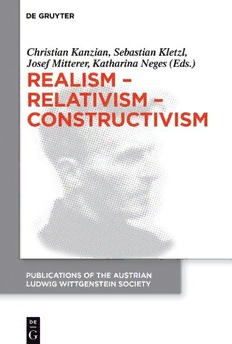
Realism - Relativism - Constructivism PDF
Preview Realism - Relativism - Constructivism
Realism – Relativism – Constructivism Publications of the Austrian Ludwig Wittgenstein Society New Series Volume 24 Realism – Relativism – Constructivism Edited by Christian Kanzian, Sebastian Kletzl, Josef Mitterer, Katharina Neges ISBN 978-3-11-046773-4 e-ISBN (PDF) 978-3-11-052405-5 e-ISBN (EPUB) 978-3-11-052342-3 ISSN 2191-8449 Library of Congress Cataloging-in-Publication Data A CIP catalog record for this book has been applied for at the Library of Congress. Bibliographic information published by the Deutsche Nationalbibliothek The Deutsche Nationalbibliothek lists this publication in the Deutsche Nationalbibliografie; detailed bibliographic data are available in the Internet at http://dnb.dnb.de. © 2017 Walter de Gruyter GmbH, Berlin/Boston Printing: CPI books GmbH, Leck ♾ Printed on acid-free paper Printed in Germany www.degruyter.com Preface Philosophical ideas can change the way we perceive and experience our world andleadourlives.Thisisnotonlycorrectforphilosophersbutinamoreindirect way also for people far away from philosophical seminars.Opinions and argu- mentsthatoriginatedinphilosophyoozeintocommonsenseandchangeitsdi- rectionandourunderstandingoftheworldwelivein.Threeimportant,spacious and far-reachingclusters of philosophical ideas that influenced for a long time howwedescribedifferentaspectsofourworldwerethetopicoftheInternation- alLudwigWittgensteinSymposiuminKirchberg2015–realism,relativism,and constructivism. To be sure all three are diffuse and heavily loaded concepts and in such caseswe–asWittgensteinputit–“strugglewithlanguage”.Ifoneaskstwophi- losopherswhatrealismis,oneendsupwith(atleast)adozendefinitions,andof course,thesamecanbesaidconcerningrelativismandconstructivism.Thiscon- fusingsituation is the reasonwhy the central concern of manyof our contribu- tions is to provide a clear and distinct definition of one or more of those con- cepts. Thisseemstobeofutmostimportanceconcerningrelativismsincethe“self- refutationargument”lurksinthebackgroundofalmosteverydiscussion.Simply put it says that a position which is seriously relativistic is either an absolutist view in disguise because it assumes its relativistic thesis to be universally true,oritisitselfonlytruerelativetosomethingelsewhichmakesitpowerless and irrelevant. Constructivism, it is often argued, falls prey to a very similar problem.Constructivistsreplacetherealistconceptoftruthwiththatofviability orasimilarconcept.Butwhy,onecouldasked,isawayofdescribingtheworld viable and another is not? It seems that in the end the world singles out some ways of coping as successful – but this is simply a form of realism. Realism on the other hand is often deemed to be useless by critics because we can never silence our doubts if we have already arrived at a correct description of the world, a doubt which is fuelled by a history of failed attempts to find out about the real“inventoryof the world”.Therefore manydiscussions in thisvol- ume try to provide a remedy to such fundamental problems, for example by showingthatrealismisareasonablepositiontotakeorthatrelativism,correctly understood, is not in any meaningful sense self-refuting. Other contributions are an attempt to apply fundamental convictions con- cerning realism, relativism and constructivism to concrete cases and examples. Especially in such discussions it is important to be clear about the extension of the concepts involved. Realism, relativism and constructivism can be explic- VI Preface itlyfoundasdesignatorsofdistinctpositionsinethics,epistemology,philosophy ofmind,ontology,andphilosophyofscience.Moreovertheuseoftheseconcepts isnotlimitedtophilosophybuttheyarealsoemployedanddiscussedinsocial andnaturalsciences,forexample,geology,history,andliterature.Itisimportant to keep in mind that in different fields those concepts might (and they usually do)describedifferentpositionsandconnections.Thestructureofthisvolumeat- tempts to make explicit some basic distinctions and to provide at least a broad scheme inwhich different positions and fine grained nuances are located. On a final note we can happily say that suitable for a conference in Kirch- bergmostcontributionsinthisvolumearewritteninwhatcanbecalleda“Witt- gensteinianspirit”.Wittgensteinhimself wasatirelessandintellectuallyhonest thinker. He took philosophical arguments serious and did not hastily abortdis- cussion butexaminedthem againandagainfromdifferentperspectives.Thisis alsotheguidingspiritofthecontributionsofthistovolume.Allparticipantsare concernedwithacollectivephilosophicalendeavour,witharespectfulexchange of thoughts, ideas and arguments and, of course, their critical examination. Regardless of disagreements, at the end of the day everyone feels that it is im- portant to get a clearer grip of realism, relativism or constructivism aiming at a better understanding of phrases like “constructing reality”, “really existing”, “matter of fact”,or “relatively true”. ThecrucialoutcomeoftheIWS2015isnotthatwefinallyknowthatthereis a realworld independent of us or that relativism in ethics is after all a rational position, but rather that the discussion between realists, relativists, and con- structivistsisanongoing,interestingandphilosophicallysignificantenterprise. Wittgenstein’sgreeting “Take your time!” may well be good advice. TheeditorswanttothanktheGovernmentofLowerAustriaandtheboardofthe AustrianLudwigWittgensteinSocietyforthesupportofourconference,andDe Gryuter for the friendly and professional cooperation. The editors Table of Contents 1 Constructivism and Beyond Krzysztof Abriszewski Are Philosophers’ Actions Realist or Constructivist? 3 Marzenna Cyzman On the Non-Dualizing Rhetoric. Some Preliminary Remarks 17 Volker Gadenne Ist der Konstruktivismus selbstwidersprüchlich? 31 Olaf Hoffjann Die Wahrheitsspieler. Strategische Kommunikation als Spiel 45 Sebastian Kletzl Who Wants to Be a Non-Dualistand Why? 59 Albert Müller Jean Piaget und die Erfindung von Radikalem Konstruktivismus und Kybernetik Zweiter Ordnung 73 Karl H. Müller Two Ways of Exploring the World 83 2 Epistemology/Epistemological Relativism Hans-Herbert Kögler The Truth of Social Constructivism 103 Gerhard Schönrich The Objectivity of Epistemic Values and the Argument from Immersion 117 Erwin Tegtmeier Epistemological Realism, Representation, and Intentionality 129 VIII TableofContents Martin G. Weiss Angelina’s Truth: Genetic Knowledge, Preventive Medicine, and the Reality of the Possible 137 3 Realism versus Relativism Heike Egner Neither Realism nor Anti-Realism: How to approach the Anthropocene? 153 Hans Rudi Fischer Ein Bild – ohne Betrachter – hielt uns gefangen. Wittgensteins ambivalenter Abschied vom Realismus 167 Michael Krausz Relativisms and Their Opposites 187 Martin Kusch When Paul Met Ludwig: Wittgensteinian Comments on Boghossian’s Antirelativism 203 Danièle Moyal-Sharrock Fighting Relativism: Wittgenstein and Kuhn 215 Franz Ofner Wissenschaftstheoretische Überlegungen jenseits von Realismus, Relativismus und Konstruktivismus 233 Peter Strasser Realism without Foundation 241 4 Ontology/Ontological Relativism Ludger Jansen Constructed Reality 255 Peter Kügler Ontological Relativism as Transcendental Nominalism 269 TableofContents IX Martine Nida-Rümelin Realism about Identity and Individuality of Conscious Beings 279 Nikos Psarros What is the Thing Whose Measure is Money? 293 5 Values and Value Relativism Paul Boghossian Relativism about Morality 301 Cora Diamond Slavery and Justice: Williams and Wiggins 313 Marie-Luisa Frick A Plurality of True Moralities? Tracing ‘Truth’ in Moral Relativism 327 Martina Herrmann Zum Wert von Vertrauen 339 Hans Kraml Die Erfindung der Sein-Sollen-Dichotomie 353 Peter Schaber Wird die Moral von uns geschaffen? 365 6 Wittgenstein David Bloor The Sociology of the Supernatural: Wittgenstein’s Lecture on Ethics 381 Rom Harré Can We Piece Together a Coherent Accountof the “Person” from the Writings of Wittgenstein? 397 Ingolf Max Wittgensteins Philosophieren zwischen Kodex und Strategie: Logik, Schach und Farbausdrücke 409
